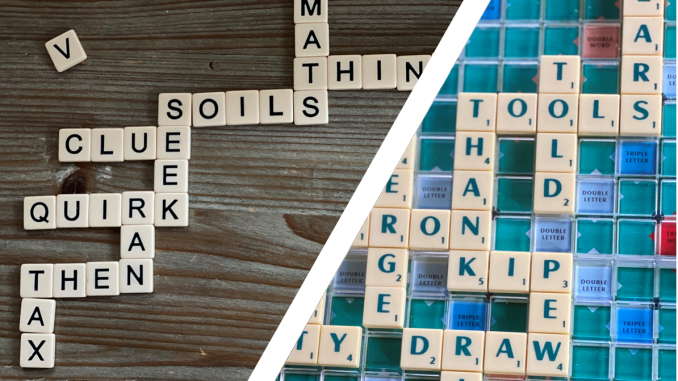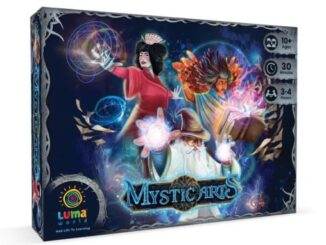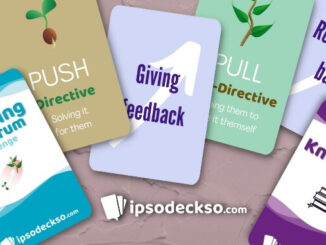
The following is a transcript of a conversation between Sarah Le-Fevre (Ludogogy) and Jeremy Dick. Jeremy contacted Ludogogy with an insight he had gained comparing the play of Bananagrams and Scrabble whilst in lockdown. To Sarah, it is reminiscent of a facilitation technique, the ‘Inquiry Question’ where participants are invited to ‘hold in mind’ (lightly) a complex question, whilst participating in a (usually novel) experience. Using the experience as a ‘lens’ through which to explore the question in new ways can result in deep learning and insights.
It is an interesting thought that commercially available games could be used in this way to facilitate learning, without the investment in time and money in designing bespoke solutions.
Ludogogy: So, what is it about Scrabble and Bananagrams that has piqued your interest?
Jeremy Dick: We have been playing Bananagrams at home practically every evening, because we are Corona-shielding with a 90-year-old with Alzheimer’s. We find that she can play Bananagrams remarkably well, despite having zero short-term memory. Having to explain the rules afresh every day got me thinking: I came to realise that my mental model of life was more Scrabble than is was Bananagrams.
L: What is it about the different ‘mental models’ of Scrabble and Bananagrams that you have noticed?
JD: In scrabble, there is a shared board, and you can only build on what you and others have already played. The rule is that any new letters must augment the existing body of words. This is neat because the game progresses linearly as each player takes their turn.
Bananagrams is quite different. Every player has their own board. To accommodate new letters, you can rearrange your whole board if you like. You usually keep most of what you’ve got; but sometimes a new letter comes along that you can only fit in by exercising drastic changes. In this way, the game progresses non-linearly. It feels less neat.
L: Why do you now feel that Bananagrams is a better analogy for you now?
JD: I sort of expected every new disruption in life to fit into the patterns I had already established. I was uncomfortable with anything that challenged my established model, and I sometimes agonised over how to stretch the puzzle pieces to make them fit. The Bananagrams concept seemed to give me permission to refactor a few things in adjusting to disruptions, and that reduced the anxiety I experienced.
L: This is really interesting for me. I’m used to facilitating learning in all sorts of areas, including aspects of ‘Living in a VUCA world’ (as we are now), quite often using games that have been specifically designed for the purpose. But this is usually done by examining how players have played the game, not as here, by using how the game itself works as an analogy. It strikes me as a really neat way to facilitate some meaningful insights, not to mention quite cost-effective, as it uses readily available commercial games, and doesn’t require specialised design.
How has the insight you have pulled from the experience of playing these two games, been useful for you practically in these difficult times?
JD: Yes, thinking about the rulesets driving different existing games has helped me think outside of the (games) box a little!
Before lockdown, I was working on the early stages of an engineering project unlike any I had encountered before. What makes it different is that it involves stages of surface and sub-surface construction over several decades, and it is impossible to know all the factors that will affect the design in advance. This means that the design has to be extremely dynamic, and indeed some parts may have to be redesigned (and rebuilt) depending on what is discovered under the ground.


While playing Bananagrams one evening, the analogy first occurred to me: I am rather more used to Scrabble-type projects where the design and construction progresses steadily through clearly planned stages, always adding to what has been done before. The new project was far more like Bananagrams, where you might chuck in all the letters to try a new arrangement at any stage.
Until the analogy occurred to me, I was resistant to a different way of working, but somehow the games gave me permission to think differently – to have a different set of perfectly valid project rules.
L: How did the project team react to these ideas?
JD: I have shared the concepts with my colleagues, and initially there were many nodding heads as they thought about it. I wrapped the concepts in new working procedures that build extensive change management into the design process. This has been very well received.
Unfortunately, I have been off the project since the start of lockdown. But other things have occurred to me during the very different rhythm of life that Covid-19 has bought to us.
L: Intriguing! What have you experienced?
JD: Well, it has become a cliché to says that this is a time of “resetting”, and I have had some aspects of my life challenged in unexpected ways. I feel as though I have had to convert my Scrabble board into a game of Bananagrams, and do some serious reorganisation.
My 28-year-old son has been sheltering with us. He is an opera singer, and there’s not much work for him at present! But he is very into mindfulness and meditation, and spending a lot of time with him has given him a chance to challenge many of the pre-conceptions I had about all of that kind of thing.
The resetting for me has been to transition from a frame of mind based very much on doing towards an approach that has a better balance between being and doing. It has been a change from thinking that, unless I am actively striving to achieve something, I am wasting time; and to accept that it is beneficial to step back from the frenzy of doing, and slow down and breathe and reflect and rest the mind. In Stephen Covey speak, I was “too busy sawing to sharpen the saw.”
Two things here: the Bananagrams model again gives me permission to accept that radical change is allowed. It is OK to reset. You don’t have to be constrained by past decisions or previous choices made by you or other players.
Second, the practice of mindfulness – intentionally, objectively examining your thoughts and freeing yourself from habitual patterns – seems itself to embody the Bananagrams philosophy.
- Bananagrams vs Scrabble – in the Covid age - 13th August 2020





Fascinating analysis. We use our bananagram letters to play a game called anagrams. We turn over one letter at a time and as soon as a player can see a four or more letter to make a word they call it out and take the letters and add the word to their word collection. In addition to making words from the letter pool you can also add letters to your own words to make a new word (new meaning – not just a plural or past tense) or to your opponents words and then you take the whole new word from them. Can be pretty cut-throat! Scored at the end of the game by giving 1 point for every tile in your word collection above the first three letters in a word. So a four letter word is 1 point and a six letter word is three points. Interesting to know where anagrams fits between the scrabble and bananagram models
I can’t say for sure, because I’m not the author of this article, but if I understand his ideas, I think your game is closer to Bananagrams, because the entire landscape of the game can change instantly (e.g. stealing words). Great game by the way. I will definitely try it out with the family. I really like it when people use exisiting game components to invent their own games. Have you seen this post? https://www.ludogogy.co.uk/focus-on-games-systems/